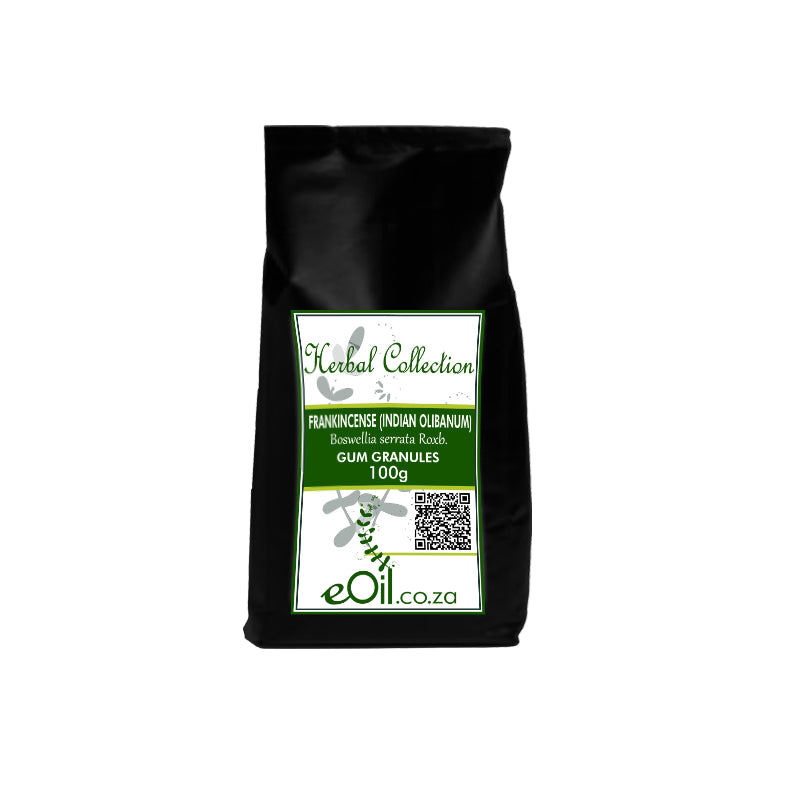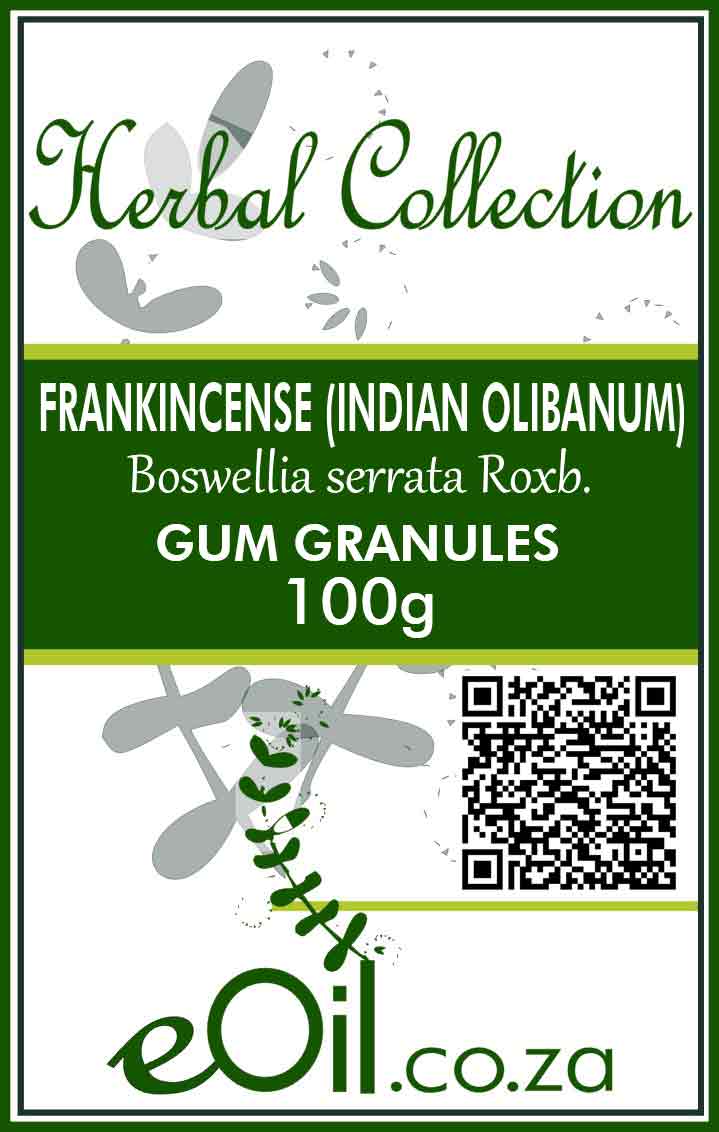Frankincense ( Boswellia Serrata ) Resin Granules - Herbal Collection
Frankincense ( Boswellia Serrata ) Resin Granules - Herbal Collection - 100 gr is backordered and will ship as soon as it is back in stock.
Description
Description
Frankincense (Boswellia serrata) resin granules are natural aromatic resins traditionally valued for incense, meditation, and wellness rituals.
Known for their rich, calming fragrance, these pure granules are harvested from the Boswellia tree and can be used for burning, purification, or crafting herbal blends
TRADITIONALLY USED FOR
Frankincense (Boswellia serrata) – Resin Granules, Powder, and Herbal Capsules
What is Frankincense (Boswellia serrata) ?
Frankincense, also known as Indian frankincense, is a resin collected from the Boswellia serrata tree. Long valued in Ayurveda and global traditional medicine, it is supplied as natural resin granules, as powdered extract, and in convenient vegan capsules.
Frankincense Resin Granules
Traditional & Modern Uses
- Anti-inflammatory: May aid joint and muscle pain, osteoarthritis, rheumatism, and other inflammatory conditions.
- Respiratory support: Traditionally used for asthma, bronchitis, and to soothe cough.
- Digestive relief: Used for inflammatory bowel disorders and digestive tract comfort.
- Aromatherapy & ritual: Burned for cleansing spaces, meditation, or spiritual practices.
- Skin health: Applied (diluted) to fungal or acne-prone skin.
How to Use
- Internal (traditional): Typical dosage is 300 mg resin, 3 times daily for 6 weeks; always consult product label or practitioner.
- Topical: Powder or resin dissolved in carrier oil for localized use.
- Burning: Place resin granules on hot charcoal in a nonflammable burner for fragrance.
COA Information
- Product: Frankincense resin granules
- Origin: India, plant verified
- Main Compounds: Boswellic acids (triterpenes), essential oils, resins, gum
Frankincense Powder
Traditional & Modern Uses
- Herbal supplement: Used for inflammation, bowel issues, asthma, skin care, and as a general wellness booster.
- Cosmetic ingredient: Powder is added to creams, scrubs, serums, and masks for anti-aging, brightening, and antioxidant action.
- Internal use: Can be dissolved in water, smoothies, or taken mixed with honey (see product instructions).
- Oil extraction: Sometimes used as a base for infusing oils or balms.
How to Use
- Oral: Typical dose is 300–500 mg (about ⅛ tsp) once or twice daily; follow specific product or practitioner advice.
- Skincare: 1–2 tsp per face mask, 1–3% of total formula for creams and lotions.
- Storage: Seal tightly, keep cool and dry.
COA Information
- Product: Powdered Boswellia serrata resin
- Key Compounds: Boswellic acids, uronic acids, essential oils, tannins
- Safety: Food grade, tested for contaminants
Frankincense Herbal Capsules
Traditional & Modern Uses
- Joint & bone health: Popular for reducing inflammation and pain in arthritis and rheumatism.
- Gut support: Used for inflammatory bowel disease (IBD), ulcerative colitis, and Crohn’s.
- Respiratory wellness: May assist with asthma and lung health.
- Stress and mood: Sometimes used to support emotional balance and immune function.
How to Use
- Typical dosage: 300–500 mg/capsule, 1–2 capsules, up to 2–3 times a day, ideally with food.
- Duration: Can be taken long-term; always check with healthcare provider, especially for chronic conditions.
- Vegan options: Many South African and international suppliers offer vegan vegetable capsules.
COA Information
- Product: Boswellia serrata resin powder in capsules
- Purity: No artificial additives, commonly COA certified for boswellic acids content (often 65%+ for standardized capsules)
Safety and Precautions
- Generally safe for adults at recommended doses (up to 1000 mg/day).
- Possible mild side effects: stomach upset, nausea, diarrhea, headache, acid reflux, or skin irritation (topically).
- Pregnancy/Breastfeeding: Not enough studies—avoid in medicinal doses.
- Interactions: May interact with blood thinners or NSAIDs. Caution if on such medication.
- Allergies: Rare, but possible skin sensitivity or contact dermatitis exists.
| Feature | Resin Granules | Powder | Capsules |
|---|---|---|---|
| Key Use | Ritual, tea, topical, supplement | Teas, smoothies, skincare, supplement | Convenient supplement |
| Main Compounds | Boswellic acids, essential oil | Boswellic acids, tannins | Standardized boswellic acid |
| Typical Dose | 300–500 mg x2–3 daily | 1/8 tsp in food x1–2 daily | 1–2 caps (300–500 mg) x2–3 daily |
| Warnings | Not in pregnancy, monitor for interaction | As above | As above |
These products are not intended as treatments for medical conditions. Always consult a healthcare provider for long-term or high-dose use, or if on medication.
INFORMATION
Source : http://www.wikiphyto.org/wiki/Encens_indien
Reference on http://www.wikiphyto.org
Translation in English by Google Translate (go to the page of the source linked | on Chrome cellphones go on the 3 dots on the top right and select translate in your preferred language | on laptop right click your mouse and select option translate when hoovering on the page
plant name
Indian incense, Indian incense , Boswellie , Salai (India)
International Latin denomination
Boswellia serrata Roxb.
botanical family
Burseraceae
Description and habitat
- Large tree native to India and also found in North Africa and the Middle East
- Different from Boswellia carterii , its smell is more terebinthaceous, but it gives off an excellent fragrance when burning
- History and tradition
- In India, China and North Africa, boswellia resin has been used for millennia.
- Traditionally, the resin of various Boswellia species was burned during religious ceremonies. The smoke of these resins is said to induce a state conducive to meditation, prayer and spiritual experience.
- Boswellia resin is part of the official pharmacopoeia of India and China. Traditional Ayurvedic medicine (India) attributes anti-inflammatory properties useful for the treatment of rheumatic pains, inflammation of the digestive tract and respiratory tract as well as various skin conditions. In traditional Chinese medicine, it is used to treat rheumatic and menstrual pain as well as bruises and other skin injuries.
- Quoted by Avicenna in the "Canon of Medicine" [1]
Parts used
- Secretion (oleoresin) collected after incision of the trunk
Dosage forms available
Usual dosages
- 300 mg of resin, three times a day, for 6 weeks for asthma or Crohn's disease, or 1.5 g, three times a day
Composition
Main components of the plant
- Triterpene acids ( boswellic acids )
- Glycosaminoglycans : 4-O-methyl-glucuronoarabinogalactan
- Essential oil , phenols , gummo-oleoresin
- Uronic acid , sterols , tannins
Main components of buds or young shoots
Main components of essential oil
Properties
Plant properties
- Anti-inflammatory ( boswellic acids ) [2] , non-steroidal type [3] tested on models of chronic arthritis and edema with carrageenan ( boswellic acids )
- Anti-inflammatory effect through inhibition of leukocyte elastase, leukotriene release and glycosaminoglycan degradation [4] , inhibition of 5-lipoxygenase [5] , [6] ,
- Immunomodulating [7] , immunostimulant, stimulation of lymphocyte proliferation [8]
Bud properties
Properties of essential oil
Directions
Indications of the whole plant (phytotherapy)
- Chronic inflammatory diseases of the joints [9] , respiratory tract, inflammatory bowel disorders, Crohn's disease and ulcerative colitis [10] , [11] , peritumoral cerebral edema [12] , [13]
- In patients with Crohn's disease taking boswellia (300 mg, three times a day, for 6 weeks), the symptoms decreased significantly in 70% of cases, while this proportion drops to 27% in subjects of the placebo group, and 350 mg three times a day for 6 weeks, resulted in 82% remission (75% for sulfasalazine 1 g three times a day)
- Inhibition of 5-lipoxygenase (interest in ulcerative colitis and Crohn's disease)
- Appears as effective as sulfasalazine, without the side effects of using this classic anti-inflammatory (clinical trials with 350 mg, three times a day for 6 weeks) [14]
- At 1200 mg, three times a day, it seems as effective, less adverse effects, than mesalazine (1.5 g, three times a day)
- Prevention of fibrosis [15]
- Asthma [16] , bronchitis and PBCO
- Inhibition of the synthesis of leukotrienes involved in inflammatory disease, and which are specifically involved in bronchoconstriction
- Rheumatoid arthritis [17]
- Osteoarthritis (gonarthrosis) [18] , positive randomized clinical study [19]
- Externally, acne, fungal infections and boils
- Antiviral activity against the Chikungunya virus [20]
Aromatherapy
- Potentialities in pancreatic cancer [21]
Known or suspected mode of action
- Probable inhibition of leukotriene synthesis
- Anti-inflammatory effect of boswellic acids
- Its combustion seems to release transhydrocannabinol , a close relative of tetrahydrocannabinol , the substance to which the psychotropic properties of cannabis are attributed.
Usual formulations
Regulations
Possible side effects and precautions for use
- Efficacy described as encouraging with no serious adverse effects (asthma, rheumatoid arthritis, Crohn's disease, osteoarthritis, collagenous colitis [22]
- Uncertain efficacy in preventing recurrence of Crohn's disease, but good tolerance [23]
- Minor adverse effects [24] , mainly gastrointestinal [19]
- Appears to have no toxicity with 2 grams per kg of body weight in rats
Bibliographic references
- Aller↑ Mahdizadeh S, Khaleghi Ghadiri M, Gorji A. Avicenna's Canon of Medicine: a review of analgesics and anti-inflammatory substances. Avicenna Journal of Phytomedicine. 2015;5(3):182-202.
- Aller↑ Singh, GB, Singh, S., & Bani, S. (1996). Anti-inflammatory actions of boswellic acids. Phytomedicine, 3(1), 81-85.
- Aller↑ Abdel-Tawab M, Werz O, Schubert-Zsilavecz M. Boswellia serrata: an overall assessment of in vitro, preclinical, pharmacokinetic and clinical data. Clin Pharmacokinet. 2011 Jun;50(6):349-69. doi: 10.2165/11586800-000000000-00000. PMID 21553931
- Aller↑ Al-Yasiry AR, Kiczorowska B. Frankincense--therapeutic properties. Postepy Hig Med Dosw (Online). 2016 Jan 4;70:380-91. PMID 27117114
- Aller↑ Safayhi H, Mack T, Sabieraj J, Anazodo MI, Subramanian LR, Ammon HP. Boswellic acids: novel, specific, nonredox inhibitors of 5-lipoxygenase. J Pharmacol Exp Ther 1992 Jun; 261(3): 1143-6 PMID 1602379
- Aller↑ Siddiqui MZ. Boswellia Serrata, A Potential Antiinflammatory Agent: An Overview. Indian Journal of Pharmaceutical Sciences. 2011;73(3):255-261. doi:10.4103/0250-474X.93507. Full Text
- Aller↑ Ammon HP. Modulation of the immune system by Boswellia serrata extracts and boswellic acids. Phytomedicine. 2010 Sep;17(11):862-7. doi: 10.1016/j.phymed.2010.03.003. PMID 20696559
- Aller↑ Mikhaeil BR, Maatooq GT, Badria FA, Amer MM. Chemistry and immunomodulatory activity of frankincense oil. Z Naturforsch C. 2003 Mar-Apr;58(3-4):230-8. PMID 12710734 full text
- Aller↑ Gupta PK, Samarakoon SM, Chandola HM, Ravishankar B. Clinical evaluation of Boswellia serrata (Shallaki) resin in the management of Sandhivata (osteoarthritis). Ayu. 2011 Oct;32(4):478-82. doi: 10.4103/0974-8520.96119. PMID 22661840 full text
- Aller↑ Langmead L, Rampton DS. Review article: complementary and alternative therapies for inflammatory bowel disease. Food Pharmacol Ther. 2006 Feb 1;23(3):341-9. PMID 16422993
- Aller↑ Gerhardt H, Seifert F, Buvari P, Vogelsang H, Repges R. Therapy of active Crohn disease with Boswellia seratta extract. Z Gastroenterol. 2001; 39:11-17. PMID 11215357
- Aller↑ Ammon HP. Boswellic acids (components of frankincense) as the active principle in treatment of chronic inflammatory diseases. Vienna Med Wochenschr. 2002;152(15-16):373-8. PMID 12244881
- Aller↑ Ammon HP. Boswellic acids in chronic inflammatory diseases. PlantaMed. 2006 Oct;72(12):1100-16. PMID 17024588
- Aller↑ Gupta I, Parihar A, Malhotra P, Singh GB, Lüdtke R, Safayhi H, Ammon HP. Effects of Boswellia serrata gum resin in patients with ulcerative colitis. Eur J Med Res. 1997 Jan;2(1):37-43. PMID 9049593
- Aller↑ Latella G, Sferra R, Vetuschi A, Zanninelli G, D'Angelo A, Catitti V, Caprilli R, Gaudio E. Prevention of colonic fibrosis by Boswellia and Scutellaria extracts in rats with colitis induced by 2,4,5-trinitrobenzene sulphonic acid. Eur J Clin Invest. 2008 Jun;38(6):410-20. doi: 10.1111/j.1365-2362.2008.01955.x. PMID 18489401
- Aller↑ Gupta I, Gupta V, Parihar A, Gupta S, Lüdtke R, Safayhi H, Ammon HP. Effects of Boswellia serrata gum resin in patients with bronchial asthma: results of a double-blind, placebo-controlled, 6-week clinical study. Eur J Med Res. 1998 Nov 17;3(11):511-4. PMID 9810030
- Aller↑ Etzel R. Special extract of BOSWELLIA serrata (H 15) in the treatment of rheumatoid arthritis. Phytomedicine. 1996 May;3(1):91-4. doi: 10.1016/S0944-7113(96)80019-5. PMID 23194870
- Aller↑ Bannuru RR, Osani MC, Al-Eid F, Wang C. Efficacy of curcumin and Boswellia for knee osteoarthritis: Systematic review and meta-analysis. Semin Arthritis Rheum. 2018 Dec;48(3):416-429. doi: 10.1016/j.semarthrit.2018.03.001. PMID 29622343 ; PMCID: PMC6131088.
- ↑ Aller à :19.0 and 19.1 Kimmatkar N, Thawani V, Hingorani L, Khiyani R. Efficacy and tolerability of Boswellia serrata extract in treatment of osteoarthritis of knee--a randomized double blind placebo controlled trial. Phytomedicine. 2003 Jan;10(1):3-7. PMID 12622457
- Aller↑ von Rhein C, Weidner T, Henß L, Martin J, Weber C, Sliva K, Schnierle BS. Curcumin and Boswellia serrata gum resin extract inhibit chikungunya and vesicular stomatitis virus infections in vitro. Antiviral Res. 2016 Jan;125:51-7. doi: 10.1016/j.antiviral.2015.11.007. PMID 26611396
- Aller↑ Ni X, Suhail MM, Yang Q, Cao A, Fung KM, Postman RG, Woolley C, Young G, Zhang J, Lin HK. Frankincense essential oil prepared from hydrodistillation of Boswellia sacra gum resins induces human pancreatic cancer cell death in cultures and in a murine xenograft model. BMC Complement Altern Med. 2012 Dec 13;12:253. doi: 10.1186/1472-6882-12-253. PMID 23237355
- Aller↑ Ernst E. Frankincense: systematic review. BMJ. 2008 Dec 17;337:a2813. doi: 10.1136/bmj.a2813. PMID 19091760 .
- Aller↑ Holtmeier W, Zeuzem S, Preiss J, Kruis W, Böhm S, Maaser C, Raedler A, Schmidt C, Schnitker J, Schwarz J, Zeitz M, Caspary W. Randomized, placebo-controlled, double-blind trial of Boswellia serrata in maintaining remission of Crohn's disease: good safety profile but lack of efficacy. Inflamm Bowel Dis. 2011 Feb;17(2):573-82. doi: 10.1002/ibd.21345. PMID 20848527
- Aller↑ Posadzki P, Watson LK, Ernst E. Adverse effects of herbal medicines: an overview of systematic reviews. Clin Med (London). 2013 Feb;13(1):7-12. Review. PMID 23472485
- Kimmatkar N et al. Efficacy and tolerability of Boswellia serrata extract in treatment of osteoarthritis of knee. Phytomedicine 2003 Jan; 10(1): 3-7
- Ammon HP, Safayhi H, Mack T, Sabieraj J. Mechanism of antiinflammatory actions of curcumin and boswellic acids. J Ethnopharmacol 1993 Mar; 38(2-3): 113-9. PMID 8510458
- Poeckel D, Tausch L, Kather N, Jauch J, Werz O. Boswellic acids stimulate arachidonic acid release and 12-lipoxygenase activity in human platelets independent of Ca2+ and differentially interact with platelet-type 12-lipoxygenase. Mol Pharmacol. 2006 Sep;70(3):1071-8. PMID 16788089
CAUTION
Store in a cool, dry place, away from light. Keep tightly closed, away from the reach of Children and pets.
Do not exceed the daily dose.
This product is not intended to prevent or cure any form of illness or disease.
If you are pregnant or nursing ; If you have a medical condition or are in the course of medical treatment ; If you are programmed for theater/operation in the near future, please consult your healthcare practitioner before using this product.
This product cannot replace a varied and balanced diet and a healthy lifestyle.
This product has not been evaluated by the SAHPRA for its quality, safety or intended use.
For More Information please check our General Safety Herbal products Page






